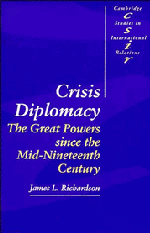Book contents
- Frontmatter
- Contents
- List of tables
- Acknowledgments
- I PART I
- PART II
- 4 The Eastern crisis, 1839–1841
- 5 The Crimean war crisis, 1853–1854
- 6 The Russo-Japanese crisis, 1903–1904
- 7 The Sudeten crisis, 1938
- 8 The Franco-Prussian and Agadir crises
- 9 Pearl Harbor and the Berlin crises
- PART III
- PART IV
- Notes
- Select bibliography
- Index
- CAMBRIDGE STUDIES IN INTERNATIONAL RELATIONS
4 - The Eastern crisis, 1839–1841
Published online by Cambridge University Press: 03 May 2011
- Frontmatter
- Contents
- List of tables
- Acknowledgments
- I PART I
- PART II
- 4 The Eastern crisis, 1839–1841
- 5 The Crimean war crisis, 1853–1854
- 6 The Russo-Japanese crisis, 1903–1904
- 7 The Sudeten crisis, 1938
- 8 The Franco-Prussian and Agadir crises
- 9 Pearl Harbor and the Berlin crises
- PART III
- PART IV
- Notes
- Select bibliography
- Index
- CAMBRIDGE STUDIES IN INTERNATIONAL RELATIONS
Summary
The Eastern crisis, which arose from a long-expected threat to the survival of the Ottoman Empire, had a number of distinctive features, the most striking of which was that the risk of war which alarmed Europe in the autumn of 1840 arose not from the issue of vital concern to four of the powers – the control of Constantinople and the Straits – but from a dispute over a much lesser issue, whether or not the ruler of Egypt, Mehemet Ali, should be permitted to retain control of Syria. This was an implausible cause of war among the powers, but it would have caused the war only indirectly, through its effect on the volatile political situation in France, where revolution or a sudden upsurge of nationalism, as was to be experienced in 1870, could never be entirely discounted. The interpretation of the crisis has not given rise to major historical debates, but in reconstructing it there is a need to take account of the extent to which British diplomatic history of the period is limited by a national perspective: the Foreign Secretary, Palmerston, indeed played the central role, but his words cannot be taken at face value.
The crisis falls squarely within the period of the Concert of Europe, and is instructive in illustrating the way in which its loosely defined conventions assisted diplomacy, and also their limitations.
- Type
- Chapter
- Information
- Crisis DiplomacyThe Great Powers since the Mid-Nineteenth Century, pp. 37 - 68Publisher: Cambridge University PressPrint publication year: 1994
- 1
- Cited by

